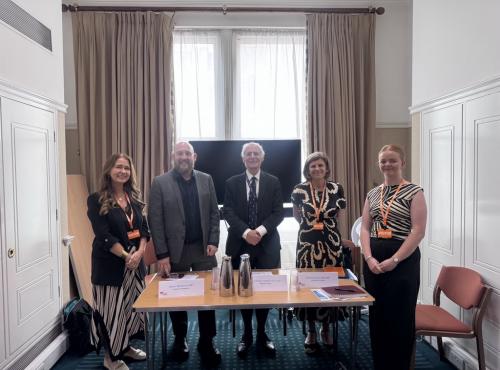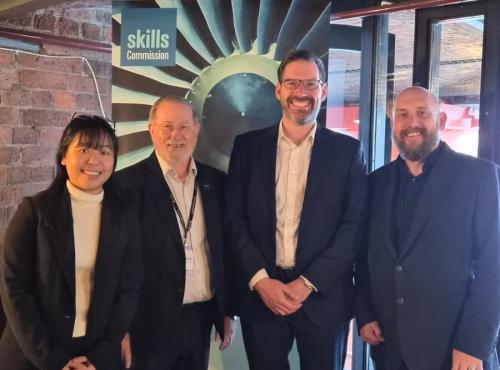Empowering Innovation: The role of universities in boosting regional economies
Increase innovation by empowering regional leaders through Innovation Deals and targeted funding, says new report on putting the Levelling Up White Paper into action.
The cross-party Higher Education Commission puts forward practical proposals to implement the ambition in the Government’s flagship Levelling Up White Paper.
This report, co-chaired by former Universities & Science Minister the Rt. Hon. Chris Skidmore MP, and Lord Norton of Louth, recommends the creation of Innovation Deals led by regional leaders. With expert knowledge of their region’s industrial strengths and research assets, regional leaders and organisations are well placed to help deliver greater R&D output. Innovation Deals will give them the powers and funding to establish innovation clusters that build on their region’s strengths. These Deals should include devolved powers on skills, to help promote a high-skill workforce which can work within the new initiatives, such as innovation districts and new industrial clusters.
The South Wales Semiconductor Cluster is a case study of best practice in an area with low pre-existing R&D activity. Building on the strengths of the local university, Cardiff University, regional leaders were able to create a cluster of research, innovation and business. This led to the founding of the Compound Semiconductor Catapult, which has helped to expand the cluster in combination with funding by UKRI.
This report heard from innovators, businesses and universities across the UK to develop policy proposals that aim to create a policy environment where developing research and innovation-led business opportunities can be done across all regions of the UK, making use of each region’s unique strengths to boost its regional economy.
Empowering Innovation found the UK needs to create a more collaborative, joined up innovation system in order to produce greater R&D activity in all corners of the UK.
Practical measures will be critical to drive up productivity and achieve levelling up, including:
- Expanding the Catapult Network into less R&D-intensive areas.
- Creating new R&D-focussed business loans and funding streams, capitalising on the new Regional Investment Funds provided by the British Business Bank.
- Expanding the successful knowledge exchange programmes – the Higher Education Innovation Fund (HEIF) and the Knowledge Transfer Partnership (KTPs) – which help to promote business productivity growth.
- Establishing new regional innovation support services and enhancing the existing R&D Tax Credit Scheme to foster SME and university innovation activity.
This report provides central and local government with policy tools to help achieve levelling up through increasing innovation, skills and jobs.
Putting power in the hands of regional civic and business leaders will enable them to take lead in shaping their economies – using local expertise to maximise their strengths and assets.
The Rt. Hon. Chris Skidmore MP (Inquiry Co-Chair)
“The Empowering Innovation report by the Higher Education Commission provides a community-based perspective on the ways the Government can achieve the goals highlighted in the Levelling Up White Paper.
Ending the historic injustice of postcode lottery and creating a future where public investment on vital R&D innovation is increased throughout the nation is one of the core principles of the Levelling Up agenda and this report offers crucial suggestions towards achieving this goal.
Furthermore, this report delivers a range of policy suggestions aimed at spreading high-skilled employment opportunities, boosting pay and productivity and most importantly, empowering local leaders to help restore pride in their local communities throughout the whole of the UK.
With the Chancellor’s Spring Statement upcoming and as we emerge from the pandemic to face serious challenges across the globe, it is vital that we hold fast to the Levelling Up agenda and rise to the challenges ahead.
The Empowering Innovation report helps set the groundwork for all these challenges to be overcome and to see the whole of the UK levelled up by 2030 and be prepared to tackle new challenges beyond.”
Lord Norton of Louth (Inquiry Co-Chair)
“As an educator, I know well the key role universities play in their regions. It is absolutely vital we provide them with the ability to help deliver transformative change to their local communities, economies and residents.
I believe this report is an important step in empowering higher education institutions, regional leaders and local communities to achieve levelling up.”
Andy Burnham, Mayor of Greater Manchester
“Since becoming Mayor of Greater Manchester, I have made the case that regional growth must be led by regional action.
I welcome the Higher Education Commission’s proposal of using more devolved funding to design and deliver transformative innovation projects. This will enable regions to reshape their economies, develop new sectors ready for the future as well as match the government ambition of levelling-up and achieving Greater Manchester’s science-based target on becoming Net Zero by 2038.”
Daniel Monaghan, report author
“Through these policy recommendations, we believe a better research and innovation system can be created to boost economies in all regions and nations of the UK. With universities leading from the front in collaborating with innovation partners, they will provide the basis to achieve the productivity growth which underpins our living standards and will help spread prosperity more fairly in the future.”
Notes to editors
For further information contact victoria.zeybrandt [at] policyconnect.org.uk (Victoria[dot]Zeybrandt[at]policyconnect[dot]org[dot]uk)
About this report:
The inquiry which produced this report was co-chaired by former Universities & Science Minister the Rt. Hon. Chris Skidmore MP, and Lord Norton of Louth. The inquiry received evidence from leading figures from parliament, industry, the higher education sector and research institutes. We have heard evidence from notable experts including Sir Jim McDonald, the President of the Royal Academy of Engineering; Henri Murison, Director of the Northern Powerhouse Partnership and Professor Kathryn Mitchell, Vice-Chancellor of the University of Derby.
The Higher Education Commission’s inquiry was sponsored by Jisc, UPP, the University of Salford and ACCA Global.
About Policy Connect:
Policy Connect is a cross-party think tank. We specialise in supporting parliamentary groups, forums and commissions, delivering impactful policy research and event programmes and bringing together parliamentarians and government in collaboration with academia, business and civil society to help shape public policy in Westminster and Whitehall, so as to improve people’s lives.
Our work focusses on five key policy areas which are: Education & Skills; Industry, Technology & Innovation; Sustainability; Health; and Assistive & Accessible Technology.
We are a social enterprise and are funded by a combination of regular annual membership subscriptions and time-limited sponsorships. We are proud to be a Disability Confident and London Living Wage employer, and a member of Social Enterprise UK.
About the Higher Education Commission:
The Higher Education Commission is an independent body made up of leaders from the education sector, the business community and the major political parties.
Established in response to demand from Parliamentarians for a more informed and reflective discourse on higher education issues, the Higher Education Commission examines higher education policy, holds evidence-based inquiries, and produces written reports with recommendations for policymakers.
For more information visit www.policyconnect.org.uk/hec/home and follow @Policy_Connect




